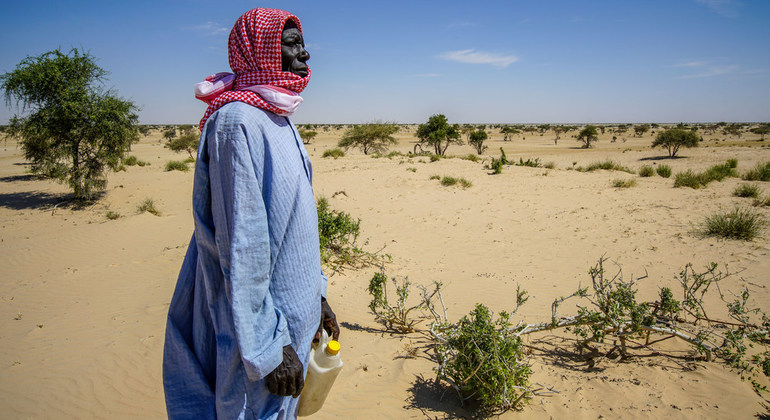UN chief warns of dangerously hot climate, and political tensions
Global warming and rising political tensions are dangerous and avoidable, UN Secretary-General António Guterres told the press on Thursday, in a statement that raises awareness of the Climate Action Summit that will take place in September.
Mr. Guterres noted that while there have always been hot summers, this is “not the summer of our youth”, but a climate emergency, in which the World Meteorological Organization (WMO) shows that, this year, we have experienced the hottest June ever. July is also on course to equal, or surpass the hottest month in recorded history, and 2015 to 2019 are likely to be the five hottest years on record.
“If we do not take action on climate change now”, said Mr. Guterres, “these extreme weather events are just the tip of the iceberg. And that iceberg is also rapidly melting.”
Here’s the full story.
Investment in family-friendly policies critical to support breastfeeding – UNICEF
While the benefits of breastfeeding for both children and mothers are extensive, policies that support nursing, particularly in workplaces, are not yet available to most mothers worldwide, according to the Head of the United Nations Children’s Fund (UNICEF).
“The health, social and economic benefits of breastfeeding – for mother and child – are well-established and accepted throughout the world”, said UNICEF Executive Director Henrietta Fore. “Yet, nearly 60 per cent of the world’s infants are missing out on the recommended six months of exclusive breastfeeding”.
From supporting healthy brain development in babies and young children, protecting infants against infection, decreasing the risk of obesity and disease, reducing healthcare costs and protecting nursing mothers against ovarian cancer and breast cancer, the benefits are widespread.
Click here for more.
UN Climate Summit: ‘ticket to entry is bold action’
The UN chief on Thursday said that the ticket for governments, business and civil society to participate in the Climate Summit is “bold action and much greater ambition”.
This will be needed if the world is to limit temperature increases to 1.5C and avoid the worst impacts of climate change, by cutting 45 per cent of greenhouse gas emissions by 2030, and achieving carbon neutrality by 2050.
“Beautiful speeches”, he continued, will not be enough.
Leaders need to come to New York on 23 September with concrete plans that include the growing use of technology that is rendering renewable energy cheaper than fossil fuels; the planting of millions of trees to reverse deforestation, and remove carbon dioxide from the environment, the finance world increasingly pricing carbon risks into their decision-making process and calling on leaders to phase out fossil fuel subsidies; and leading businesses are recognizing that, in order to avoid huge losses, now is the time to move from the “grey”, polluting economy, to the green economy.
“We need rapid and deep change in how we do business, generate power, build cities and feed the world”, concluded Mr. Guterres.
Rising political heat
The Secretary-General also turned his attention to tensions in global politics – notably in the Persian Gulf – and friction between China and the United States as well as between nuclear-armed States.
Referring to recent incidents in the Strait of Hormuz that include the diversion of a British-flagged oil tanker by Iran, the US destruction of an Iranian drone, and the UK’s decision to provide a naval escort for tankers, he spelled out that a minor miscalculation in the Persian Gulf could lead to a major confrontation.
On China-US relations, Mr. Guterres said that the lessons of the Cold War must be learned to avoid a new one as two competing blocs emerge, each with their own dominant currency, trade rules and contradictory geopolitical and military rules.
“With leadership committed to strategic cooperation and to managing competing interests”, he said, “we can steer the world onto a safer path”.
The imminent end of the landmark Intermediate Nuclear Forces Treaty means that the world will lose an “invaluable brake” on nuclear war, continued Mr. Guterres.
States with nuclear arms capacity should avoid destabilizing developments and urgently seek a new path towards new international arms control measures, which include extending the so-called “New Start” agreement between the US and Russia; and the 2020 Review of the Treaty on the Non-Proliferation of Nuclear Weapons.
Board of Inquiry in northwest Syria
The Secretary-General announced on Thursday that he would establish an internal UN Headquarters Board of Inquiry to investigate a series of incidents that have occurred in northwest Syria since last September, when Russia and Turkey signed the Memorandum on Stabilization of the Situation in the Idlib De-escalation Area.
According to his spokesperson, Stéphane Dujarric, “the investigation will cover destruction of, or damage to facilities on the deconfliction list and UN-supported facilities in the area”.
Upon its establishment, Mr. Guterres urged all parties to cooperate with the Board, which will ascertain the facts and report back to the UN chief when its work is completed.
Mr. Dujarric said that “once the Board has been set up and is ready to commence its work” a further statement will be issued.
Listen to or download our audio News in Brief for 1 August on SoundCloud:








